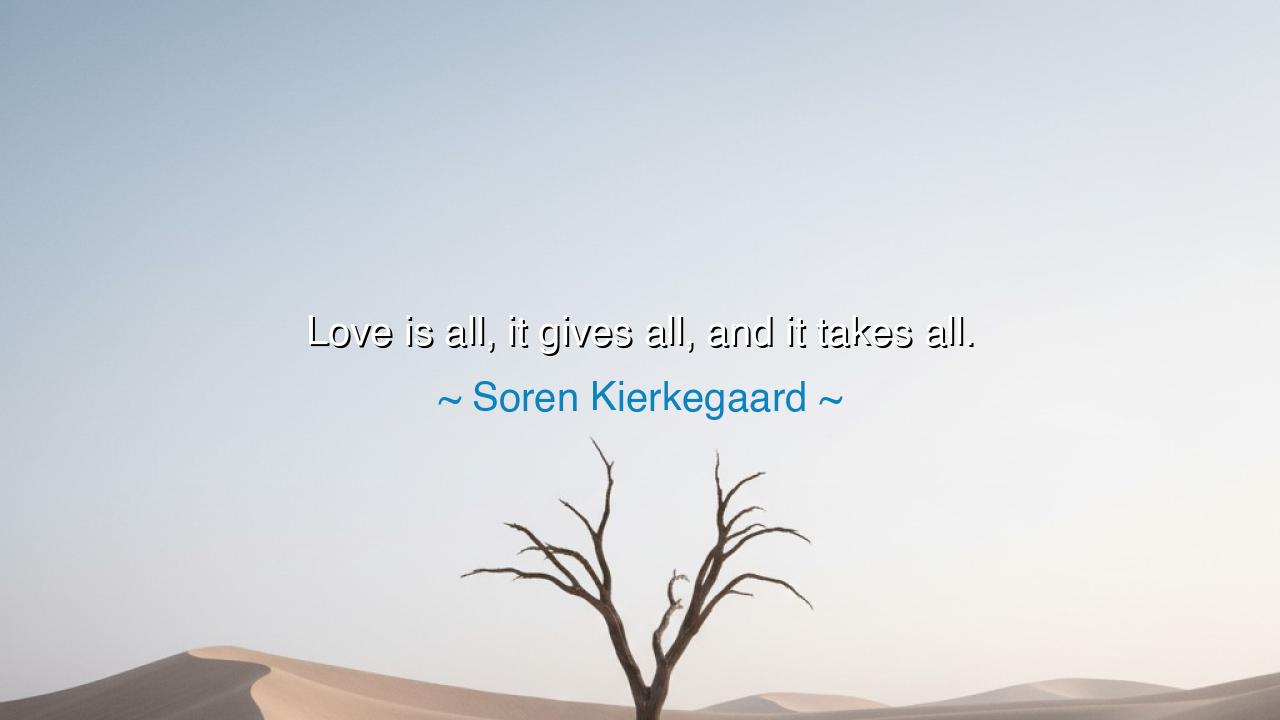
Love is all, it gives all, and it takes all.






“Love is all, it gives all, and it takes all.” — Thus wrote Søren Kierkegaard, the melancholy philosopher of Denmark, whose soul wrestled with the mysteries of faith, passion, and the human heart. In these few words, he captures the essence of love as the most complete and consuming force in existence — a power that encompasses creation and destruction, joy and sorrow, giving and taking. To Kierkegaard, love was not a passing emotion or a gentle comfort; it was the fire at the heart of all being — both the divine flame that warms and the sacred fire that burns.
The origin of this saying can be found in Kierkegaard’s writings on Christian love, where he sought to reconcile the passionate love of man with the selfless love of God. Living in the 19th century, he wrote in a world torn between faith and reason, where many spoke of love as sentiment or social duty. But Kierkegaard saw deeper. He understood that love cannot be tamed into convenience — that it demands everything from the soul that dares to embrace it. For true love, he wrote, “is infinite,” and because it is infinite, it cannot exist halfway. To love truly is to give all of oneself — and to risk all in return.
When he says that love gives all, Kierkegaard speaks of love’s divine generosity. To love another — be it friend, lover, or God — is to pour oneself out without reserve. It is to give time, patience, forgiveness, and trust — even when it costs dearly. Such love asks no price, for its nature is to give. It is the wellspring of compassion that forgives the unforgivable, that endures in silence when unreturned, that blesses even those who wound it. To love is to surrender the self, to open one’s heart until nothing is withheld. In this way, love mirrors the Creator — for it is in giving that love finds its fulfillment.
But Kierkegaard, ever the truth-teller, does not veil the other side of this mystery. “Love takes all,” he says — for the same fire that gives warmth also consumes. To love deeply is to become vulnerable to loss, to disappointment, to the ache of separation. The one who loves opens his soul not only to joy, but to suffering. Yet Kierkegaard saw this not as tragedy, but as sacred necessity. Love must take all, for it must burn away selfishness, pride, and illusion. What it takes, it purifies; what it removes, it redeems. Only through such stripping can the heart become truly free.
Consider the story of Antony and Cleopatra, whose love defied empires and reason alike. Their passion united them beyond politics and power, yet it also led them to ruin. To the world, their end seemed folly — the destruction of two mighty souls. But from the ancient lens, one can see that their love, fierce and total, revealed the truth of Kierkegaard’s words: love gives all, and it takes all. It elevated them beyond ambition, yet consumed them in the same flame. Love, in its fullness, cannot exist without risk; it is the highest and most dangerous calling of the human heart.
Yet Kierkegaard’s vision is not merely tragic — it is redemptive. For when love gives all and takes all, it leads the soul to transformation. It breaks open the heart so that it may grow vast enough to contain eternity. The one who loves truly may suffer, but he also lives most fully. The coward who withholds his love, who gives little to avoid loss, may avoid pain — but he also avoids life. Love, in its divine fullness, demands everything because it is everything. To resist it is to resist life itself; to yield to it is to walk the narrow path to grace.
Therefore, dear listener, learn this sacred balance: do not fear the giving, and do not resent the taking. Love is not possession, but participation — a dance between soul and soul, between man and the eternal. When it gives, be grateful; when it takes, be humble; when it breaks you, let it rebuild you anew. For through every loss that love inflicts, something deeper is revealed — the infinite nature of your own heart. To love and to suffer, to give and to lose, are but stages on the same divine journey.
This, then, is the eternal wisdom of Søren Kierkegaard: that love is all — it is the beginning and the end, the giver and the taker, the joy and the cross. It strips the soul bare, only to clothe it again in the garments of eternity. Do not seek to control it, for love belongs not to man, but to the divine. Instead, surrender to its mystery. Let it teach you to give without measure, to endure without resentment, to live without fear. For when you love in this way — completely, courageously, selflessly — you will have touched the infinite, and in that touch, you will have truly lived.






AAdministratorAdministrator
Welcome, honored guests. Please leave a comment, we will respond soon